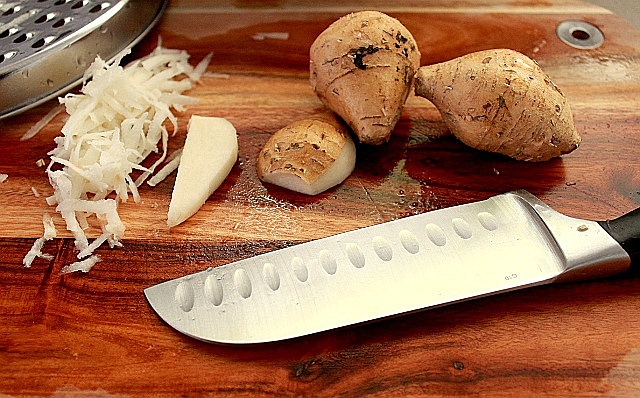Jicama (the scientific name is Pachyrhizuserosus) is a round, fleshy root vegetable which can be found easily in many parts of Central and South America, South Asia and The Caribbean. It is the refreshing, crispy, creamy white tuber with tasty fruit flavor that can be eaten raw or cooked in a variety delicious dishes worldwide.
 Img source: flickr.com
Img source: flickr.com
Jicama Nutrition Facts:
Jicama contains about 86 to about 90 percent water and a rich source of anti-oxidants, dietary fiber, along with many essential vitamins and minerals such as folates as well as magnesium. Therefore, it’s a naturally low-calorie food and can benefit to the immune system, improve digestion, assist weight control and support bone health.
According USDA National Nutrient database, 100 grams of raw jicama has about:
- 38 calories (2% of RDA)
- 0.19 grams fat (<1% of RDA)
- 4.9 grams fiber (13% of RDA)
- 0.72 grams protein (1% of RDA)
- 8.82 grams carbs (7% of RDA)
- 21 IU vitamin A (1% of RDA)
- 20.2 milligrams vitamin C (34% of RDA)
- 0.06 milligrams vitamin B6 (3% of RDA)
- 150 milligrams potassium (3% of RDA)
- 0.59 milligrams iron (7% of RDA)
- 0.60 milligrams manganese (3% of RDA)
- 12 milligrams magnesium (3% of RDA)
- 12 micrograms folate (3% of RDA)
Health benefits of Jicama:
-
Jicama boosts digestion:
With high dietary fiber content, particularly finest source of oligofructose inulin, Jicama is a perfect food for those who are suffering from constipation and need to improve digestion. The oligofructose inulin is considered indigestible in your body, together with water, it aids in softening the stools in the intestine and pushing them out until they are excreted. Furthermore, when it reaches the intestine, inulin works as a prebiotic, which helps probiotics (commonly known as “good bacteria” that lives in the gastrointestinal tract) do the job best and absorb redundant stomach acid to prevent heartburn and acidity.
-
Jicama increases immune function:
Over 75% of immune function is actually stored in your gastrointestinal tract, and with the big amount of valuable prebiotics, Jicama helps to balance the growth of good and bad bacteria within your intestine. Otherwise, Jicama provides about 34% of RDA of vitamin C per 100 grams, which is known as a powerful anti-oxidant that can fight free radicals as well as boost the immune system, thereby supporting skin health. In addition, it acts like an anti-inflammatory agent and is normally used in the treatment of sore throat, flu or cold.
-
Jicama supports weight loss:
Thanks to containing a low source of calorie (only 38 calories per 100 grams) and high source of fiber, Jicama is apparently perfect for individuals who are in attempt to lose weight but still want to take in some healthy sweet snacks when starving. As being digested, high-fiber foods like Jicama will help expand the stomach and then absorb water, hence, it is an extremely great tool for keeping you staying full as well as managing your appetite.
-
Jicama helps protect heart health:
High cholesterol level resulting from unhealthy fast food is one of the serious factors triggering heart attack, stroke or diabetes. It has been proven that people who have a fiber-rich diet will reduce the higher risk of high cholesterol level. The soluble fiber present in Jicama is excellent for lowering cholesterol and stabilizing sugar level in blood as well. Moreover, with the large amount of potassium, Jicama is also able to help control blood pressure. It reduces the pressure on blood vessels and arteries, and thus lowering the tension on the cardiovascular system.
-
Jicama improves brain function:
Due to the significant amount of group B vitamin, especially vitamin B-6, jicama shows its effectiveness in supporting brain development and function, influencing mood, preventing depression and dealing with the lack of concentration. It helps our body to release energy by breaking down proteins into usable amino acid. Vitamin B-6 supporting the nervous system function properly, along with vitamin B-12, helps to form red blood cells and antibodies to protect our body from harmful viruses and bacteria.
-
Jicama builds strong bones:
You might be surprised that jicama is a strong bones “builder”. Thanks to the important minerals present in Jicama, including manganese, magnesium and iron, this root vegetable can be a great booster for your bones. These minerals are essential to build strong bones and for the healing of any bone that has been broken or damaged. Apart from that, it assists in preventing osteoporosis which is known as one of the common health ailments occurring mostly in the elderly worldwide.
Precautions:
Although the root of Jicama is extremely good for people’s health, the other parts of this plant is toxic. Avoid eating seeds, leaves, flowers or vines of the plan as they contain a natural insecticide called rotenone to protect the whole plant from predators. To eat Jicama raw, it is highly recommended to peel its thick skin off and then cut it into thin slices. Eventually, you can simply enjoy the juicy fresh taste of this wonderful vegetable.
Ashley Bennet
This article is written by Ashley Bennet, a co-owner of AuthorityRemedies. She has worked and trained in the field of Nutrition and Health for over 3 years, consistently providing people with useful information about nutrition as well as helping them with their common health problems.



I am so pleased to find this article. I really didn’t know jicama’s benefits. You are sharing great info and I found this article very helpful for me. Thanks a lot for the great article.